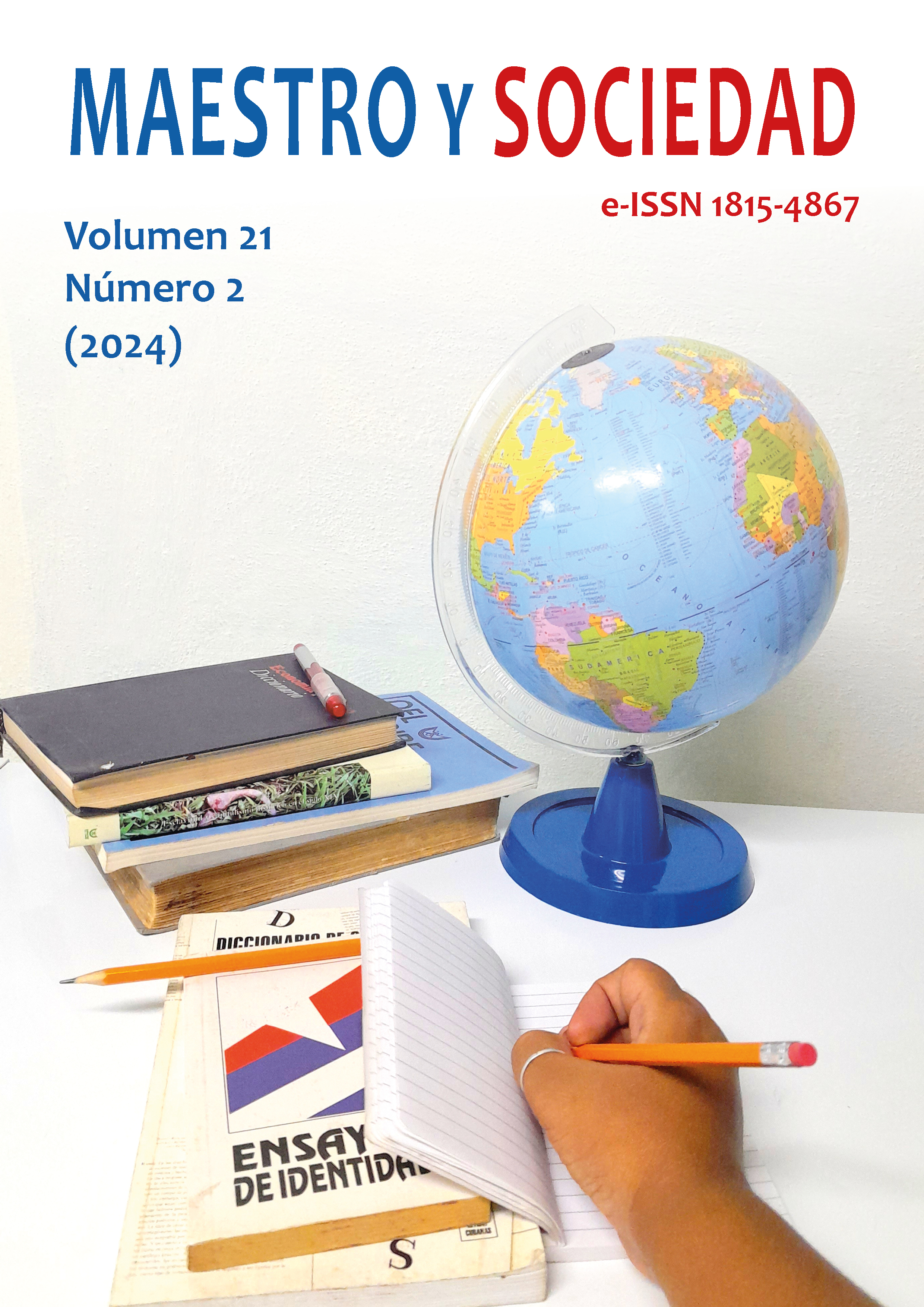Career guidance in Latin America and the Caribbean: (1722-2006)
Keywords:
professional orientation, stages, social actors, vocation, Latin AmericaAbstract
Introduction: The process of professional guidance has accompanied human beings since ancient times, maintaining a close link with the social transformations that humanity has gone through in its course and responding directly to the function of work and the perception of social actors. about the various professions. In this sense, this research aims to analyze the stages of the process and its impact in Latin America and the Caribbean, which offers a coherent analysis of the background of this activity on the continent. Materials and methods: For a correct study of the process, it is necessary to use methods such as historical-logical methods that allow us to conceive the stages through which it has gone and the aspects that have been ignored by the hegemonic power circles of the sciences that, even ignored the creation in Cuba in 1855, of the General Preparatory School, in addition to the reference to the matter that José Martí makes in this regard, through his interventions in 1887 related to the nascent schools of arts and crafts in several Latin American nations, in addition , of the leading role of the Cuban Emilio Mira López in the institutionalization of the process in Latin America. Results: From the study, it is possible to highlight the philosophical nature of professional guidance that determined its development in the ancient world. In that period it was assumed to be the path used by the philosophers of the time, who, through discipleship, guided their doctrines. The most significant examples are that of Socrates (469-399 BC), of whom Plato and Antisthenes were disciples, and that of Plato himself (428-427-347 BC), to whom numerous disciples are attributed. Discussion: From this perspective, professional guidance is understood as a decision that does not correspond to the social actors, but is perceived as a predestination coming from the divine power of God. Even though the above is questioned by Farfán's research (2023), through criticism in his analysis of vocational choice as a concept. On the other hand, Gottfredson (2021) refers to the process as the construction of tastes conditioned by social nature. Conclusions: The above allowed us to analyze the stages of the professional guidance process and its impact in Latin America and the Caribbean, offering a coherent analysis of the antecedents of this activity on the continent, even before the institutionalization of the term, allowing us to ensure the authenticity of Latin American thought in this sense, although the colonial characteristics through which the continent passed have favored these aspects to be unfairly underestimated in numerous studies that addressed the subject.
References
Castellanos, R.; Baute, M. y Chang, J. (2020). Orígenes, desarrollo histórico y tendencias de la orientación profesional. Revista Universidad y Sociedad, 12(5), 269-278.
Companioni, O. (2011). Una mirada a la orientación profesional desde el enfoque histórico cultural en la educación superior actual., en Contribuciones a las Ciencias Sociales, Servicios Académicos Intercontinentales SL. https://ideas.repec.org/a/erv/coccss/y2011i2011-1246.html
Delgado Fernández, A., & Mosqueda Mosqueda, E. (2024). Evolución histórica del proceso de orientación profesional y su impacto en Cuba. Varona, (79). Recuperado a partir de http://revistas.ucpejv.edu.cu/index.php/rVar/article/view/2183
Delgado FernándezA., & Leal CosmeY. (2023). El proceso de orientación profesional desde la visión sociológica de José Martí. Varona, (77). Recuperado a partir de http://revistas.ucpejv.edu.cu/index.php/rVar/article/view/2171
Dillon, F.; Rojas, D., Lara, E. & Freire, I. (2022). Vocational and professional guidance as an alternative in the choice of university careers. Revista Cátedra, 6 (1). https://doi.org/10.29166/catedra.v6i1.4109
Durkheim, E. [1922] (2009). Sociología y educación. Madrid. Editorial: Populares, S. A.
El Redactor. (1855.11.22). La escuela preparatoria. Santiago de Cuba, Cuba.
Farfán Mejía, E. (2023). Análisis histórico de la de la elección vocacional como concepto. Revista Cognosis. Revista de Filosofía, Letras y Ciencias de la Educación, 8(2), 15-26. https://revistas.utm.edu.ec/index.php/Cognosis/article/view/5423
Fitzenberger, B., Hillerich_Sigg, A. y Sprietsma, M. (2020). Different counselors, many options. Career Guidance and Career plans in secondary school, De Gruyter, 1, 65-106. https://doi.org/101515/ger-2019-0027
Gottfredson, L. (2021). The Transition to Noncommunicable Disease: How to Reduce Its Unsustainable Global Burden by Increasing Cognitive Access to Health Self-Management. Journal of Intelligence, 9(4), 61. https://doi.org/10.3390/jintelligence9040061
Keshf, Z. y Khanum, S. (2021). Career Gidance and Counseling Need in a Developing Country´s Context: A Qualitative Study. SAGE Open, 11(3). https://doi.org/10.1177/21582440211040119
Martí, J. (1975). Obras Completas. T. 8. La Habana, Cuba: Editorial Ciencias Sociales.
Matos, C. Z. (2004): La orientación profesional en Cuba. Algunas consideraciones sobre su evolución histórica. EduSol, 4(10), septiembre-diciembre: 46-51
Mosqueda, M. E. (2018): Prácticas institucionales y factores sociales en el proceso Orientación Profesional en Santiago de Cuba. [Tesis de doctorado. Universidad de Oriente].
Mosqueda, M. E. et al. (2018). El deber ser de la Orientación Profesional: aspectos normativos. Universidad de Oriente.
Portuondo, O. (2015). Santiago de Cuba, Cinco Siglos de Historia. Santiago de Cuba, Cuba: Ediciones Alqueza. Oficina del Conservador de la Ciudad. https://isbn.cloud/9789597181118/santiago-de-cuba-cinco-siglos-de-historia/
Remón Fonseca, D. B., Gómez Morales, Y. y Arribas Llópis, P. E. (2019). La orientación profesional. Un reto educativo. Didáctica Y Educación, 10(6), 91–103. https://revistas.ult.edu.cu/index.php/didascalia/article/view/1085
Vélaz de Medrano, C.; González, A.; Otero, A. (2023). Análisis comparado del modelo de organización de los servicios de orientación profesional en el contexto europeo. Revista Española de Orientación y Psicopedagogía, 34(2), 29–46. https://doi.org/10.5944/reop.vol.34.num.2.2023.38065
Weber, M. (1989). La ética protestante y el espíritu del capitalismo. México: Editorial Premia, la red de Jonás
Published
How to Cite
Issue
Section
License
Copyright (c) 2024 Lidia de las Mercedes Ferrer-Tellez

This work is licensed under a Creative Commons Attribution-NonCommercial-NoDerivatives 4.0 International License.
This journal provides immediate open access to its content, based on the principle that offering the public free access to research helps a greater global exchange of knowledge. Each author is responsible for the content of each of their articles.



























 Universidad de Oriente
Universidad de Oriente 